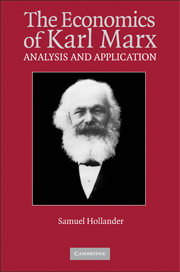Book contents
- Frontmatter
- Contents
- Preface
- Introduction
- Part One CAPITAL: PRINCIPLE FEATURES OF THE MARXIAN “CANON”
- Part Two ORIGINS: MARX IN THE 1840s
- 6 Marx's Economics 1843–1845
- 7 A “First Draft” of Capital 1847–1849
- Part Three A “SECOND DRAFT” OF CAPITAL: THE GRUNDRISSE 1857–1858
- Part Four A “THIRD DRAFT” OF CAPITAL: THE ECONOMIC MANUSCRIPTS 1861–1863
- Part Five TOPICS IN APPLICATION
- Conclusion: A Recapitulation and Overview
- Appendices
- Bibliography
- Index
6 - Marx's Economics 1843–1845
Published online by Cambridge University Press: 25 June 2009
- Frontmatter
- Contents
- Preface
- Introduction
- Part One CAPITAL: PRINCIPLE FEATURES OF THE MARXIAN “CANON”
- Part Two ORIGINS: MARX IN THE 1840s
- 6 Marx's Economics 1843–1845
- 7 A “First Draft” of Capital 1847–1849
- Part Three A “SECOND DRAFT” OF CAPITAL: THE GRUNDRISSE 1857–1858
- Part Four A “THIRD DRAFT” OF CAPITAL: THE ECONOMIC MANUSCRIPTS 1861–1863
- Part Five TOPICS IN APPLICATION
- Conclusion: A Recapitulation and Overview
- Appendices
- Bibliography
- Index
Summary
Introduction
The so-called Economical and Philosophical Manuscripts – three documents, the first of which is broken off unfinished while only a fraction of the second is extant – written in Paris between Spring and August 1844, contain Marx's first tentative steps in economics. Ricardo and Smith figure large, and Pierre Joseph Proudhon emerges as a central figure. In the Preface we find a general obligation expressed to the German socialists Hess, Weitling and Engels and to unspecified French and English socialists. Also on record are Marx's Paris reading notes in nine notebooks, with extracts from and commentary on (inter alia) Engels, Smith, Ricardo, James Mill, McCulloch (the last four in French translation), Bentham, Lauderdale, Say, Destutt de Tracy, Sismondi, and Boisguillebert. The least fragmentary of the notebook comments is devoted to Mill – a 7000-word commentary on his Elements. As for their composition, accounts range from late 1843 through January 1845. Considering the unfinished state of both sets of documents and doubts regarding the precise dating of the notebooks, it is unsafe to take for granted a “progression” of substantive ideas from the notebooks to the manuscripts although the latter are somewhat more formal in character. In fact, it will emerge that the notebooks in some respects show greater analytical maturity, or at least greater familiarity with Ricardian economics.
- Type
- Chapter
- Information
- The Economics of Karl MarxAnalysis and Application, pp. 165 - 193Publisher: Cambridge University PressPrint publication year: 2008



